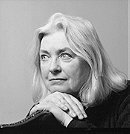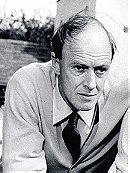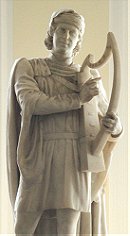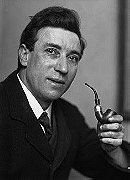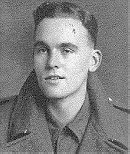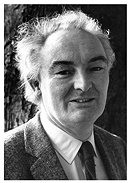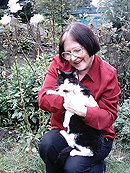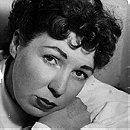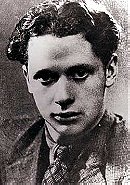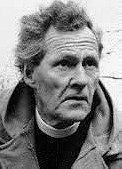Welsh Poets & Poems
Sort by:
Showing 16 items
Rating:
List Type:
DANNIE ABSE: CRICKET BALL
1935, I watched Glamorgan play
especially, Slogger Smart, free
from the disgrace of fame, unrenowned,
but the biggest hit with me.
A three-spring flash of willow
and suddenly, the sound of summer
as the thumped ball, alive, would leave
the applauding ground.
Once, hell for leather, it curled
over the workman's crane
in Westgate Street
to crash, they said, through a discreet
Angel Hotel windowpane.
But I, a pre-war boy,
(or someone with my name)
wanted it, that Eden day,
to scoot around the turning world,
to mock physics and gravity,
to rainbow-arch the posh hotel
higher, deranged, on and on, allegro,
(the Taff a gleam of mercury below)
going, going, gone
towards the Caerphilly mountain range.
Vanishings! The years, too, gone like change.
But the travelling Taff seems the same.
It's late, I peer at the failing sky
over Westgate Street
and wait. I smell cut grass.
I shine an apple on my thigh.
1935, I watched Glamorgan play
especially, Slogger Smart, free
from the disgrace of fame, unrenowned,
but the biggest hit with me.
A three-spring flash of willow
and suddenly, the sound of summer
as the thumped ball, alive, would leave
the applauding ground.
Once, hell for leather, it curled
over the workman's crane
in Westgate Street
to crash, they said, through a discreet
Angel Hotel windowpane.
But I, a pre-war boy,
(or someone with my name)
wanted it, that Eden day,
to scoot around the turning world,
to mock physics and gravity,
to rainbow-arch the posh hotel
higher, deranged, on and on, allegro,
(the Taff a gleam of mercury below)
going, going, gone
towards the Caerphilly mountain range.
Vanishings! The years, too, gone like change.
But the travelling Taff seems the same.
It's late, I peer at the failing sky
over Westgate Street
and wait. I smell cut grass.
I shine an apple on my thigh.
Kenji's rating:


GILLIAN CLARKE: COLD KNAP LAKE
We once watched a crowd
pull a drowned child from the lake.
Blue lipped and dressed in water’s long green silk
she lay for dead.
Then kneeling on the earth,
a heroine, her red head bowed,
her wartime cotton frock soaked,
my mother gave a stranger’s child her breath.
The crowd stood silent,
drawn by the dread of it.
The child breathed, bleating
and rosy in my mother’s hands.
My father took her home to a poor house
and watched her thrashed for almost drowning.
Was I there?
Or is that troubled surface something else
shadowy under the dipped fingers of willows
where satiny mud blooms in cloudiness
after the treading, heavy webs of swans
as their wings beat and whistle on the air?
All lost things lie under closing water
in that lake with the poor man’s daughter.
GILLIAN CLARKE: OVERHEARD IN COUNTY SLIGO
I married a man from County Roscommon
and I live in the back of beyond
with a field of cows and a yard of hens
and six white geese on the pond.
At my door’s a square of yellow corn
caught up by its corners and shaken,
and the road runs down through the open gate
and freedom’s there for the taking.
I had thought to work on the Abbey stage
or have my name in a book,
to see my thought on the printed page,
or still the crowd with a look.
But I turn to fold the breakfast cloth
and to polish the lustre and brass,
to order and dust the tumbled rooms
and find my face in the glass.
I ought to feel I’m a happy woman
for I lie in the lap of the land,
but I married the man from County Roscommon
and I live at the back of beyond.
We once watched a crowd
pull a drowned child from the lake.
Blue lipped and dressed in water’s long green silk
she lay for dead.
Then kneeling on the earth,
a heroine, her red head bowed,
her wartime cotton frock soaked,
my mother gave a stranger’s child her breath.
The crowd stood silent,
drawn by the dread of it.
The child breathed, bleating
and rosy in my mother’s hands.
My father took her home to a poor house
and watched her thrashed for almost drowning.
Was I there?
Or is that troubled surface something else
shadowy under the dipped fingers of willows
where satiny mud blooms in cloudiness
after the treading, heavy webs of swans
as their wings beat and whistle on the air?
All lost things lie under closing water
in that lake with the poor man’s daughter.
GILLIAN CLARKE: OVERHEARD IN COUNTY SLIGO
I married a man from County Roscommon
and I live in the back of beyond
with a field of cows and a yard of hens
and six white geese on the pond.
At my door’s a square of yellow corn
caught up by its corners and shaken,
and the road runs down through the open gate
and freedom’s there for the taking.
I had thought to work on the Abbey stage
or have my name in a book,
to see my thought on the printed page,
or still the crowd with a look.
But I turn to fold the breakfast cloth
and to polish the lustre and brass,
to order and dust the tumbled rooms
and find my face in the glass.
I ought to feel I’m a happy woman
for I lie in the lap of the land,
but I married the man from County Roscommon
and I live at the back of beyond.
Kenji's rating:


ROALD DAHL: THE PIG
In England once there lived a big
And wonderfully clever pig.
To everybody it was plain
That Piggy had a massive brain.
He worked out sums inside his head,
There was no book he hadn’t read.
He knew what made an airplane fly,
He knew how engines worked and why.
He knew all this, but in the end
One question drove him round the bend:
He simply couldn’t puzzle out
What LIFE was really all about.
What was the reason for his birth?
Why was he placed upon this earth?
His giant brain went round and round.
Alas, no answer could be found.
Till suddenly one wondrous night.
All in a flash he saw the light.
He jumped up like a ballet dancer
And yelled, “By gum, I’ve got the answer!”
“They want my bacon slice by slice
“To sell at a tremendous price!
“They want my tender juicy chops
“To put in all the butcher’s shops!
“They want my pork to make a roast
“And that’s the part’ll cost the most!
“They want my sausages in strings!
“They even want my chitterlings!
“The butcher’s shop! The carving knife!
“That is the reason for my life!”
Such thoughts as these are not designed
To give a pig great piece of mind.
Next morning, in comes Farmer Bland,
A pail of pigswill in his hand,
And piggy with a mighty roar,
Bashes the farmer to the floor…
Now comes the rather grizzly bit
So let’s not make too much of it,
Except that you must understand
That Piggy did eat Farmer Bland,
He ate him up from head to toe,
Chewing the pieces nice and slow.
It took an hour to reach the feet,
Because there was so much to eat,
And when he finished, Pig, of course,
Felt absolutely no remorse.
Slowly he scratched his brainy head
And with a little smile he said,
“I had a fairly powerful hunch
“That he might have me for his lunch.
“And so, because I feared the worst,
“I thought I’d better eat him first.”
In England once there lived a big
And wonderfully clever pig.
To everybody it was plain
That Piggy had a massive brain.
He worked out sums inside his head,
There was no book he hadn’t read.
He knew what made an airplane fly,
He knew how engines worked and why.
He knew all this, but in the end
One question drove him round the bend:
He simply couldn’t puzzle out
What LIFE was really all about.
What was the reason for his birth?
Why was he placed upon this earth?
His giant brain went round and round.
Alas, no answer could be found.
Till suddenly one wondrous night.
All in a flash he saw the light.
He jumped up like a ballet dancer
And yelled, “By gum, I’ve got the answer!”
“They want my bacon slice by slice
“To sell at a tremendous price!
“They want my tender juicy chops
“To put in all the butcher’s shops!
“They want my pork to make a roast
“And that’s the part’ll cost the most!
“They want my sausages in strings!
“They even want my chitterlings!
“The butcher’s shop! The carving knife!
“That is the reason for my life!”
Such thoughts as these are not designed
To give a pig great piece of mind.
Next morning, in comes Farmer Bland,
A pail of pigswill in his hand,
And piggy with a mighty roar,
Bashes the farmer to the floor…
Now comes the rather grizzly bit
So let’s not make too much of it,
Except that you must understand
That Piggy did eat Farmer Bland,
He ate him up from head to toe,
Chewing the pieces nice and slow.
It took an hour to reach the feet,
Because there was so much to eat,
And when he finished, Pig, of course,
Felt absolutely no remorse.
Slowly he scratched his brainy head
And with a little smile he said,
“I had a fairly powerful hunch
“That he might have me for his lunch.
“And so, because I feared the worst,
“I thought I’d better eat him first.”
Kenji's rating:


DAFYDD AP GWILYM: THE WOODLAND MASS
A pleasant place I was at today,
under mantles of the worthy green hazel,
listening at day’s beginning
to the skilful cock thrush
singing a splendid stanza
of fluent signs and symbols;
a stranger here, wisdom his nature,
a brown messenger who had journeyed far,
coming from rich Carmarthenshire
at my golden girl’s command.
About him was a setting
of flowers of the sweet boughs of May,
like green mantles, his chasuble
was of the wings of the wind.
There was here, by the great God,
nothing but gold in the altar’s canopy.
I heard, in polished language,
a long and faultless chanting,
an unhesitant reading to the people
of a gospel without mumbling;
the elevation, on the hill for us there,
of a good leaf for a holy wafer.
Then the slim eloquent nightingale
from the corner of a grove nearby,
poetess of the valley, sings to the many
the Sanctus bell in lively whistling
The sacrifice is raised
up to the sky above the bush,
devotion to God the Father,
the chalice of ecstasy and love.
The psalmody contents me;
it was bred of a birch-grove in the sweet woods.
(translation from Welsh)
DAFYDD AP GWILYM: TROUBLE AT AN INN
Tale of a Wayside Inn
With one servant, I went down
To a sportive sort of town
Where a Welshman might secure
Comely welcome, and pleasure.
There we found the book to sign
In the inn, and ordered wine.
But whatever did I see
But the loveliest lady
Blooming beautiful and bright,
Blossom stemming from sunlight,
Graceful as the gossamer.
I said, ‘Let me banquet her!’
Feasting’s a fine way, it seems,
For fulfilling young men’s dreams.
So, unshy, she took her seat
At my side, and we did eat,
Sipped our wine, and smiled and dallied
Like a man and maid, new-married.
Bold I was, but whispering,
And the others heard nothing.
Troth and tryst we pledged, to keep
When the others were asleep.
I should find my way, and come
Through the darkness to her room.
Love would haul my steps aright
Down the hallways of the night;
Love would steer my steps, – alas,
This was not what came to pass.
For, by some outrageous miss,
what I got was not a kiss,
But a stubble-whiskered cheek
And a triple whiskey-reek,
Not one Englishman, but three,
(What a Holy Trinity!)
Diccon, ’Enry, Jerk-off Jack,
Each one pillowed on his pack.
One of them let out a yell,
’What’s that thing I think I smell?
there’s a Welshman must have hid
In the closet or under t’bed,
Come to cut our throats with knive,
Guard your wallets and your lives,
They’re all thieves, beyond all doubt,
Throw the bloody bugger out!’
None too nimble for my need,
First I found how shins will bleed
When you bark them in your haste
On a stool that’s been misplaced
By some ostler-stupid fool,
Then the sawney of a stool
Squealed its pig-stuck tattle-tale
After my departing trail.
By good luck, I never got
Wet-foot from the chamber-pot.
That was all I saved myself,
Knocked my noggin on a shelf,
Overturned the table-trestles,
Down came all the pans and kettles.
As I dove to outer dark,
All the dogs began to bark.
Asses bray, and scullions rouse
Every sleeper in the house.
I could hear the hunt come round me,
Scowl-faced scoundrels, till they found me.
I could feel their stones and sticks,
So I clasped my crucifix,
Jesu, Jesu, Jesu dear,
Don’t let people catch me here!
Since my prayer was strong, I came
Through the mercy of His name
Safely to my room at last,
All my perils over-passed.
No girl’s love to ease my plight,
Only God’s that dreadful night,
To the saints be brought the praise,
And the Good Lord mend my wicked ways.
(translation from Welsh, medieval poem)
DAFYDD AP GWILYM: MAY AND JANUARY
Greetings, splendid greenwood choir,
Summer's May month--since for that I long--
strong horseman, lover's recompense,
with a green fetter mastering the wild forest,
the friend of love and friend of birds;
lovers are mindful of him, their kinsman he is,
ambassador for nine score lovers' trysts
for honourable, loving dialogue.
By Mary, it is a delightful thing
that May, the perfect month, is on the way,
intent--in ardent affirmation of his rank--
upon the conquest of each verdant glen.
In a dense screen, the clothing of the high-roads,
he has dressed all the places in his web of green.
When there comes, after a battle with the frost'
the tent of thick leaves to invigorate the fields'
green will be the paths of May
succeeding April (birds' chirping is my faith);
on topmost branches of the oak will come
the singing of the new-fledged birds,
and the cuckoo high over each land,
and a songster; with a long and joyful day,
and white mist-haze after the wind
protects the middle of the valley,
and the sky at afternoon is clear and glad
with green trees and fresh gossamer,
and crowds of birds upon the trees,
and fresh leaves on forest saplings,
and Morfudd my golden girl, will come to [my] mind
with all love's seven-times-nine tumultuous turns.
All unlike to the sad black month
which rebukes everyone for loving,
and brings short days and depressing rain,
and wind that will despoil the trees,
and weakness--terrifying frailty--
a trailing cloak with rain and hail,
incitement to high tides, and colds,
grey flooding water-courses down the valleys,
rivers in spate with raucous noise,
and day-time sad and wearisome,
skies overcast, sombre and chill,
their hue hiding from us the moon.
Let there come to him--threat that's easy to predict--
evil two-fold for his boorishness!
(translation from Welsh, medieval poem)
A pleasant place I was at today,
under mantles of the worthy green hazel,
listening at day’s beginning
to the skilful cock thrush
singing a splendid stanza
of fluent signs and symbols;
a stranger here, wisdom his nature,
a brown messenger who had journeyed far,
coming from rich Carmarthenshire
at my golden girl’s command.
About him was a setting
of flowers of the sweet boughs of May,
like green mantles, his chasuble
was of the wings of the wind.
There was here, by the great God,
nothing but gold in the altar’s canopy.
I heard, in polished language,
a long and faultless chanting,
an unhesitant reading to the people
of a gospel without mumbling;
the elevation, on the hill for us there,
of a good leaf for a holy wafer.
Then the slim eloquent nightingale
from the corner of a grove nearby,
poetess of the valley, sings to the many
the Sanctus bell in lively whistling
The sacrifice is raised
up to the sky above the bush,
devotion to God the Father,
the chalice of ecstasy and love.
The psalmody contents me;
it was bred of a birch-grove in the sweet woods.
(translation from Welsh)
DAFYDD AP GWILYM: TROUBLE AT AN INN
Tale of a Wayside Inn
With one servant, I went down
To a sportive sort of town
Where a Welshman might secure
Comely welcome, and pleasure.
There we found the book to sign
In the inn, and ordered wine.
But whatever did I see
But the loveliest lady
Blooming beautiful and bright,
Blossom stemming from sunlight,
Graceful as the gossamer.
I said, ‘Let me banquet her!’
Feasting’s a fine way, it seems,
For fulfilling young men’s dreams.
So, unshy, she took her seat
At my side, and we did eat,
Sipped our wine, and smiled and dallied
Like a man and maid, new-married.
Bold I was, but whispering,
And the others heard nothing.
Troth and tryst we pledged, to keep
When the others were asleep.
I should find my way, and come
Through the darkness to her room.
Love would haul my steps aright
Down the hallways of the night;
Love would steer my steps, – alas,
This was not what came to pass.
For, by some outrageous miss,
what I got was not a kiss,
But a stubble-whiskered cheek
And a triple whiskey-reek,
Not one Englishman, but three,
(What a Holy Trinity!)
Diccon, ’Enry, Jerk-off Jack,
Each one pillowed on his pack.
One of them let out a yell,
’What’s that thing I think I smell?
there’s a Welshman must have hid
In the closet or under t’bed,
Come to cut our throats with knive,
Guard your wallets and your lives,
They’re all thieves, beyond all doubt,
Throw the bloody bugger out!’
None too nimble for my need,
First I found how shins will bleed
When you bark them in your haste
On a stool that’s been misplaced
By some ostler-stupid fool,
Then the sawney of a stool
Squealed its pig-stuck tattle-tale
After my departing trail.
By good luck, I never got
Wet-foot from the chamber-pot.
That was all I saved myself,
Knocked my noggin on a shelf,
Overturned the table-trestles,
Down came all the pans and kettles.
As I dove to outer dark,
All the dogs began to bark.
Asses bray, and scullions rouse
Every sleeper in the house.
I could hear the hunt come round me,
Scowl-faced scoundrels, till they found me.
I could feel their stones and sticks,
So I clasped my crucifix,
Jesu, Jesu, Jesu dear,
Don’t let people catch me here!
Since my prayer was strong, I came
Through the mercy of His name
Safely to my room at last,
All my perils over-passed.
No girl’s love to ease my plight,
Only God’s that dreadful night,
To the saints be brought the praise,
And the Good Lord mend my wicked ways.
(translation from Welsh, medieval poem)
DAFYDD AP GWILYM: MAY AND JANUARY
Greetings, splendid greenwood choir,
Summer's May month--since for that I long--
strong horseman, lover's recompense,
with a green fetter mastering the wild forest,
the friend of love and friend of birds;
lovers are mindful of him, their kinsman he is,
ambassador for nine score lovers' trysts
for honourable, loving dialogue.
By Mary, it is a delightful thing
that May, the perfect month, is on the way,
intent--in ardent affirmation of his rank--
upon the conquest of each verdant glen.
In a dense screen, the clothing of the high-roads,
he has dressed all the places in his web of green.
When there comes, after a battle with the frost'
the tent of thick leaves to invigorate the fields'
green will be the paths of May
succeeding April (birds' chirping is my faith);
on topmost branches of the oak will come
the singing of the new-fledged birds,
and the cuckoo high over each land,
and a songster; with a long and joyful day,
and white mist-haze after the wind
protects the middle of the valley,
and the sky at afternoon is clear and glad
with green trees and fresh gossamer,
and crowds of birds upon the trees,
and fresh leaves on forest saplings,
and Morfudd my golden girl, will come to [my] mind
with all love's seven-times-nine tumultuous turns.
All unlike to the sad black month
which rebukes everyone for loving,
and brings short days and depressing rain,
and wind that will despoil the trees,
and weakness--terrifying frailty--
a trailing cloak with rain and hail,
incitement to high tides, and colds,
grey flooding water-courses down the valleys,
rivers in spate with raucous noise,
and day-time sad and wearisome,
skies overcast, sombre and chill,
their hue hiding from us the moon.
Let there come to him--threat that's easy to predict--
evil two-fold for his boorishness!
(translation from Welsh, medieval poem)
Kenji's rating:


W H DAVIES: LEISURE
What is this life if, full of care,
We have no time to stand and stare?—
No time to stand beneath the boughs,
And stare as long as sheep and cows:
No time to see, when woods we pass,
Where squirrels hide their nuts in grass:
No time to see, in broad daylight,
Streams full of stars, like skies at night:
No time to turn at Beauty's glance,
And watch her feet, how they can dance:
No time to wait till her mouth can
Enrich that smile her eyes began?
A poor life this if, full of care,
We have no time to stand and stare.
W.H.DAVIES: THE VILLAIN
While joy gave clouds the light of stars,
That beamed wher'er they looked;
And calves and lambs had tottering knees,
Excited, while they sucked;
While every bird enjoyed his song,
Without one thought of harm or wrong--
I turned my head and saw the wind,
Not far from where I stood,
Dragging the corn by her golden hair,
Into a dark and lonely wood.
What is this life if, full of care,
We have no time to stand and stare?—
No time to stand beneath the boughs,
And stare as long as sheep and cows:
No time to see, when woods we pass,
Where squirrels hide their nuts in grass:
No time to see, in broad daylight,
Streams full of stars, like skies at night:
No time to turn at Beauty's glance,
And watch her feet, how they can dance:
No time to wait till her mouth can
Enrich that smile her eyes began?
A poor life this if, full of care,
We have no time to stand and stare.
W.H.DAVIES: THE VILLAIN
While joy gave clouds the light of stars,
That beamed wher'er they looked;
And calves and lambs had tottering knees,
Excited, while they sucked;
While every bird enjoyed his song,
Without one thought of harm or wrong--
I turned my head and saw the wind,
Not far from where I stood,
Dragging the corn by her golden hair,
Into a dark and lonely wood.
Kenji's rating:


ALUN LEWIS: THE SENTRY
I have begun to die.
For now at last i know
That there is no escape
From Night. Not any dream
Not breathless images of sleep
Touch my bat’s-eyes. I hang
Leathery-arid from the hidden roof
Of Night, and sleeplessly
I watch within Sleep’s province.
I have left
The lovely bodies of the boy and girl
Deep in each othr’s placid arms;
And i have left
The beautiful lanes of sleep
That barefoot lovers follow to this last
Cold shore of thought i guard.
I have begun to die
Amid the guns’ implacable silence
Is my black interim, my youth and age,
In the flower of fury, the folded poppy,
Night.
ALUN LEWIS: RAIDERS' DAWN
Softly the civilized
Centuries fall,
Paper on paper,
Peter on Paul.
And lovers walking
From the night —
Eternity’s masters,
Slaves of Time —
Recognize only
The drifting white
Fall of small faces
In pits of lime.
Blue necklace left
On a charred chair
Tells that Beauty
Was startled there.
ALUN LEWIS: ALL DAY IT HAS RAINED
All day it has rained, and we on the edge of the moors
Have sprawled in our bell-tents, moody and dull as boors,
Groundsheets and blankets spread on the muddy ground
And from the first grey wakening we have found
No refuge from the skirmishing fine rain
And the wind that made the canvas heave and flap
And the taut wet guy-ropes ravel out and snap.
All day the rain has glided, wave and mist and dream,
Drenching the gorse and heather, a gossamer stream
Too light to stir the acorns that suddenly
Snatched from their cups by the wild south-westerly
Pattered against the tent and our upturned dreaming faces.
And we stretched out, unbuttoning our braces,
Smoking a Woodbine, darning dirty socks,
Reading the Sunday papers - I saw a fox
And mentioned it in the note I scribbled home; -
And we talked of girls and dropping bombs on Rome,
And thought of the quiet dead and the loud celebrities
Exhorting us to slaughter, and the herded refugees;
As of ourselves or those whom we
For years have loved, and will again
Tomorrow maybe love; but now it is the rain
Possesses us entirely, the twilight and the rain.
And I can remember nothing dearer or more to my heart
Than the children I watched in the woods on Saturday
Shaking down burning chestnuts for the schoolyard's merry play,
Or the shaggy patient dog who followed me
By Sheet and Steep and up the wooded scree
To the Shoulder o' Mutton where Edward Thomas brooded long
On death and beauty - till a bullet stopped his song.
I have begun to die.
For now at last i know
That there is no escape
From Night. Not any dream
Not breathless images of sleep
Touch my bat’s-eyes. I hang
Leathery-arid from the hidden roof
Of Night, and sleeplessly
I watch within Sleep’s province.
I have left
The lovely bodies of the boy and girl
Deep in each othr’s placid arms;
And i have left
The beautiful lanes of sleep
That barefoot lovers follow to this last
Cold shore of thought i guard.
I have begun to die
Amid the guns’ implacable silence
Is my black interim, my youth and age,
In the flower of fury, the folded poppy,
Night.
ALUN LEWIS: RAIDERS' DAWN
Softly the civilized
Centuries fall,
Paper on paper,
Peter on Paul.
And lovers walking
From the night —
Eternity’s masters,
Slaves of Time —
Recognize only
The drifting white
Fall of small faces
In pits of lime.
Blue necklace left
On a charred chair
Tells that Beauty
Was startled there.
ALUN LEWIS: ALL DAY IT HAS RAINED
All day it has rained, and we on the edge of the moors
Have sprawled in our bell-tents, moody and dull as boors,
Groundsheets and blankets spread on the muddy ground
And from the first grey wakening we have found
No refuge from the skirmishing fine rain
And the wind that made the canvas heave and flap
And the taut wet guy-ropes ravel out and snap.
All day the rain has glided, wave and mist and dream,
Drenching the gorse and heather, a gossamer stream
Too light to stir the acorns that suddenly
Snatched from their cups by the wild south-westerly
Pattered against the tent and our upturned dreaming faces.
And we stretched out, unbuttoning our braces,
Smoking a Woodbine, darning dirty socks,
Reading the Sunday papers - I saw a fox
And mentioned it in the note I scribbled home; -
And we talked of girls and dropping bombs on Rome,
And thought of the quiet dead and the loud celebrities
Exhorting us to slaughter, and the herded refugees;
As of ourselves or those whom we
For years have loved, and will again
Tomorrow maybe love; but now it is the rain
Possesses us entirely, the twilight and the rain.
And I can remember nothing dearer or more to my heart
Than the children I watched in the woods on Saturday
Shaking down burning chestnuts for the schoolyard's merry play,
Or the shaggy patient dog who followed me
By Sheet and Steep and up the wooded scree
To the Shoulder o' Mutton where Edward Thomas brooded long
On death and beauty - till a bullet stopped his song.
GWYNETH LEWIS: SEA VIRUS
I knew I should never have gone below
but I did, and the fug of bilges and wood
caught me aback. The sheets of my heart
snapped taut to breaking, as a gale
stronger than longing filled the sail
inside me. To be shot of land
and its wood smoke! To feel the keel
cold in a current! To see the mast
inscribing water like a restless pen
writing a fading wake! It’s true,
I’m ruined. Not even peace will do
to keep me ashore now. Not even you.
I knew I should never have gone below
but I did, and the fug of bilges and wood
caught me aback. The sheets of my heart
snapped taut to breaking, as a gale
stronger than longing filled the sail
inside me. To be shot of land
and its wood smoke! To feel the keel
cold in a current! To see the mast
inscribing water like a restless pen
writing a fading wake! It’s true,
I’m ruined. Not even peace will do
to keep me ashore now. Not even you.
ROBERT MINHINNICK: THE FOX IN THE NATIONAL MUSEUM OF WALES
He scans the frames but doesn’t stop,
the fox who has come to the museum today,
his eye in the renaissance
and his brush in the baroque.
Between dynasties his footprints
have still to fade, between the Shan and the Yung,
the porcelain atoms shivering at his touch,
ah, lighter than the emperor’s breath, drinking rice wine from the bowl,
daintier than the eunuch pouring wine.
I came as quickly as I could
but already the fox had left the Industrial Revolution behind,
his eye has swept the age of atoms,
the Taj Mahal within the molecule.
The fox is in the fossils and the folios, I cry.
The fox is in photography and the folk studies department.
The fox is in the flux of the foyer,
the fox is in the flock,
the fox is in the flock.
Now the fox sniffs at the dodo
and at the door of Celtic orthography.
The grave-goods, the chariots, the gods of darkness,
he has made their acquaintance on previous occasions.
There, beneath the leatherbacked turtle he goes,
the turtle black as an oildrum,
under the skeleton of the whale he skedaddles,
the whalebone silver as bubblewrap.
Through the light of Provence moves the fox, through
the Ordovician era and the Sumerian summer,
greyblue the blush on him, this one who has seen so much,
blood on the bristles of his mouth,
and on his suit of iron filings the air fans like silk.
Through the cubists and the surrealists
this fox shimmies surreptitiously,
past the artist who has sawn himself in half
under the formaldehyde sky
goes this fox shiny as a silver
fax in his fox coat,
for at a fox trot travels this fox
backwards and forwards in the museum.
Under the bells of brugmansia
that lull the Ecuadoran botanists to sleep,
over the grey moss of Iceland
further and further goes this fox,
passing the lambs at the feet of Jesus,
through the tear in Dante’s cloak.
How long have I legged it
after his legerdemain, this fox
in the labyrinth, this fox that never hurries
yet passes an age in a footfall, this fox
from the forest of the portrait gallery
to engineering’s cornfield sigh?
I will tell you this.
He is something to follow,
this red fellow.
This fox I foster –
he is the future.
No-one else
has seen him yet.
But they are closing
the iron doors.
He scans the frames but doesn’t stop,
the fox who has come to the museum today,
his eye in the renaissance
and his brush in the baroque.
Between dynasties his footprints
have still to fade, between the Shan and the Yung,
the porcelain atoms shivering at his touch,
ah, lighter than the emperor’s breath, drinking rice wine from the bowl,
daintier than the eunuch pouring wine.
I came as quickly as I could
but already the fox had left the Industrial Revolution behind,
his eye has swept the age of atoms,
the Taj Mahal within the molecule.
The fox is in the fossils and the folios, I cry.
The fox is in photography and the folk studies department.
The fox is in the flux of the foyer,
the fox is in the flock,
the fox is in the flock.
Now the fox sniffs at the dodo
and at the door of Celtic orthography.
The grave-goods, the chariots, the gods of darkness,
he has made their acquaintance on previous occasions.
There, beneath the leatherbacked turtle he goes,
the turtle black as an oildrum,
under the skeleton of the whale he skedaddles,
the whalebone silver as bubblewrap.
Through the light of Provence moves the fox, through
the Ordovician era and the Sumerian summer,
greyblue the blush on him, this one who has seen so much,
blood on the bristles of his mouth,
and on his suit of iron filings the air fans like silk.
Through the cubists and the surrealists
this fox shimmies surreptitiously,
past the artist who has sawn himself in half
under the formaldehyde sky
goes this fox shiny as a silver
fax in his fox coat,
for at a fox trot travels this fox
backwards and forwards in the museum.
Under the bells of brugmansia
that lull the Ecuadoran botanists to sleep,
over the grey moss of Iceland
further and further goes this fox,
passing the lambs at the feet of Jesus,
through the tear in Dante’s cloak.
How long have I legged it
after his legerdemain, this fox
in the labyrinth, this fox that never hurries
yet passes an age in a footfall, this fox
from the forest of the portrait gallery
to engineering’s cornfield sigh?
I will tell you this.
He is something to follow,
this red fellow.
This fox I foster –
he is the future.
No-one else
has seen him yet.
But they are closing
the iron doors.
LESLIE NORRIS: PIT PONIES
They come like the ghosts of horses, shyly,
To this summer field, this fresh green,
Which scares them.
They have been too long in the blind mine,
Their hooves have trodden only stones
And the soft, thick dust of fine coal,
And they do not understand the grass.
For over two years their sun
Has shone from an electric bulb
That has never set, and their walking
Has been along the one, monotonous
Track of pulled coal-trucks.
They have bunched their muscles against
The harness and pulled, and hauled.
But now they have come out of the underworld
And are set down in the sun and real air,
Which are strange to them. They are humble
And modest, their heads are downcast, they
Do not expect to see very far. But one
Is attempting a clumsy gallop. It is
Something he could do when he was very young,
When he was a little foal a long time ago
And he could run fleetly on his long foal’s legs,
And almost he can remember this. And look,
One rolls on her back with joy in the clean grass!
And they all, awkwardly and hesitantly, like
Clumsy old men, begin to run, and the field
Is full of happy thunder. They toss their heads,
Their manes fly, they are galloping in freedom.
The ponies have come above ground, they are galloping!
They come like the ghosts of horses, shyly,
To this summer field, this fresh green,
Which scares them.
They have been too long in the blind mine,
Their hooves have trodden only stones
And the soft, thick dust of fine coal,
And they do not understand the grass.
For over two years their sun
Has shone from an electric bulb
That has never set, and their walking
Has been along the one, monotonous
Track of pulled coal-trucks.
They have bunched their muscles against
The harness and pulled, and hauled.
But now they have come out of the underworld
And are set down in the sun and real air,
Which are strange to them. They are humble
And modest, their heads are downcast, they
Do not expect to see very far. But one
Is attempting a clumsy gallop. It is
Something he could do when he was very young,
When he was a little foal a long time ago
And he could run fleetly on his long foal’s legs,
And almost he can remember this. And look,
One rolls on her back with joy in the clean grass!
And they all, awkwardly and hesitantly, like
Clumsy old men, begin to run, and the field
Is full of happy thunder. They toss their heads,
Their manes fly, they are galloping in freedom.
The ponies have come above ground, they are galloping!
JOHN ORMOND: CATHEDRAL BUILDERS
They climbed on sketchy ladders towards God,
with winch and pulley hoisted hewn rock into heaven,
inhabited the sky with hammers,
defied gravity,
deified stone,
took up God's house to meet him,
and came down to their suppers
and small beer,
every night slept, lay with their smelly wives,
quarrelled and cuffed the children,
lied, spat, sang, were happy, or unhappy,
and every day took to the ladders again,
impeded the rights of way of another summer's swallows,
grew greyer, shakier,
became less inclined to fix a neighbour's roof of a fine evening,
saw naves sprout arches, clerestories soar,
cursed the loud fancy glaziers for their luck,
somehow escaped the plague,
got rheumatism,
decided it was time to give it up,
to leave the spire to others,
stood in the crowd, well back from the vestments at the consecration,
envied the fat bishop his warm boots,
cocked a squint eye aloft,
and said, 'I bloody did that.'
They climbed on sketchy ladders towards God,
with winch and pulley hoisted hewn rock into heaven,
inhabited the sky with hammers,
defied gravity,
deified stone,
took up God's house to meet him,
and came down to their suppers
and small beer,
every night slept, lay with their smelly wives,
quarrelled and cuffed the children,
lied, spat, sang, were happy, or unhappy,
and every day took to the ladders again,
impeded the rights of way of another summer's swallows,
grew greyer, shakier,
became less inclined to fix a neighbour's roof of a fine evening,
saw naves sprout arches, clerestories soar,
cursed the loud fancy glaziers for their luck,
somehow escaped the plague,
got rheumatism,
decided it was time to give it up,
to leave the spire to others,
stood in the crowd, well back from the vestments at the consecration,
envied the fat bishop his warm boots,
cocked a squint eye aloft,
and said, 'I bloody did that.'
SHEENAGH PUGH: SOMETIMES
Sometimes things don't go, after all,
from bad to worse. Some years, muscadel
faces down frost; green thrives; the crops don't fail,
sometimes a man aims high, and all goes well.
A people sometimes will step back from war;
elect an honest man, decide they care
enough, that they can't leave some stranger poor.
Some men become what they were born for.
Sometimes our best efforts do not go
amiss, sometimes we do as we meant to.
The sun will sometimes melt a field of sorrow
that seemed hard frozen: may it happen for you.
Sometimes things don't go, after all,
from bad to worse. Some years, muscadel
faces down frost; green thrives; the crops don't fail,
sometimes a man aims high, and all goes well.
A people sometimes will step back from war;
elect an honest man, decide they care
enough, that they can't leave some stranger poor.
Some men become what they were born for.
Sometimes our best efforts do not go
amiss, sometimes we do as we meant to.
The sun will sometimes melt a field of sorrow
that seemed hard frozen: may it happen for you.
LYNETTE ROBERTS: POEM FROM LLANYBRI (1944)
If you come my way that is …
Between now and then, I will offer you
A fist full of rock cress fresh from the bank
The valley tips of garlic red with dew
Cooler than shallots, a breath you can swank
In the village when you come. At noon-day
I will offer you a choice bowl of cawl
Served with a ’lover’s’ spoon and a chopped spray
Of leeks or savori fach, not used now,
In the old way you’ll understand. The din
Of children singing through the eyelet sheds
Ringing smith hoops, chasing the butt of hens;
Or I can offer you Cwmcelyn spread
With quartz stones from the wild scratchings of men:
You will have to go carefully with clogs
Or thick shoes for it’s treacherous the fen,
The East and West Marshes also have bogs.
Then I’ll do the lights, fill the lamp with oil,
Get coal from the shed, water from the well;
Pluck and draw pigeon, with crop of green foil
This your good supper from the lime-tree fell.
A sit by the hearth with blue flames rising,
No talk. Just a stare at ‘Time’ gathering
Healed thoughts, pool insight, like swan sailing
Peace and sound around the home, offering
You a night’s rest and my day’s energy.
You must come – start this pilgrimage
Can you come? – send an ode or elegy
In the old way and raise our heritage.
If you come my way that is …
Between now and then, I will offer you
A fist full of rock cress fresh from the bank
The valley tips of garlic red with dew
Cooler than shallots, a breath you can swank
In the village when you come. At noon-day
I will offer you a choice bowl of cawl
Served with a ’lover’s’ spoon and a chopped spray
Of leeks or savori fach, not used now,
In the old way you’ll understand. The din
Of children singing through the eyelet sheds
Ringing smith hoops, chasing the butt of hens;
Or I can offer you Cwmcelyn spread
With quartz stones from the wild scratchings of men:
You will have to go carefully with clogs
Or thick shoes for it’s treacherous the fen,
The East and West Marshes also have bogs.
Then I’ll do the lights, fill the lamp with oil,
Get coal from the shed, water from the well;
Pluck and draw pigeon, with crop of green foil
This your good supper from the lime-tree fell.
A sit by the hearth with blue flames rising,
No talk. Just a stare at ‘Time’ gathering
Healed thoughts, pool insight, like swan sailing
Peace and sound around the home, offering
You a night’s rest and my day’s energy.
You must come – start this pilgrimage
Can you come? – send an ode or elegy
In the old way and raise our heritage.
OWEN SHEERS: NOT YET MY MOTHER
Yesterday I found a photo
of you at seventeen,
holding a horse and smiling,
not yet my mother.
The tight riding hat hid your hair,
and your legs were still the long shins of a boy’s.
You held the horse by the halter,
your hand a fist under its huge jaw.
The blown trees were still in the background
and the sky was grained by the old film stock,
but what caught me was your face,
which was mine.
And I thought, just for a second, that you were me.
But then I saw the woman’s jacket,
nipped at the waist, the ballooned jodhpurs,
and of course the date, scratched in the corner.
All of which told me again,
that this was you at seventeen, holding a horse
and smiling, not yet my mother,
although I was clearly already your child.
OWEN SHEERS: STAMMERER ON SCREE
This slope is my language.
A shifting skin of stone
that slips under my grip,
feet pedalling the one moving spot,
sharded slate, flowing hard water.
But when I am still,
crabbed against its steepness,
cheek to its side, a child on its mother,
then it stops.
Stone-ticks out to quiet,
rests itself on the mountain,
meaning everything.
Until I move again,
when it spreads under my hand,
slides from under my climbing feet,
like words from under a memory,
vowels from under a tongue.
Yesterday I found a photo
of you at seventeen,
holding a horse and smiling,
not yet my mother.
The tight riding hat hid your hair,
and your legs were still the long shins of a boy’s.
You held the horse by the halter,
your hand a fist under its huge jaw.
The blown trees were still in the background
and the sky was grained by the old film stock,
but what caught me was your face,
which was mine.
And I thought, just for a second, that you were me.
But then I saw the woman’s jacket,
nipped at the waist, the ballooned jodhpurs,
and of course the date, scratched in the corner.
All of which told me again,
that this was you at seventeen, holding a horse
and smiling, not yet my mother,
although I was clearly already your child.
OWEN SHEERS: STAMMERER ON SCREE
This slope is my language.
A shifting skin of stone
that slips under my grip,
feet pedalling the one moving spot,
sharded slate, flowing hard water.
But when I am still,
crabbed against its steepness,
cheek to its side, a child on its mother,
then it stops.
Stone-ticks out to quiet,
rests itself on the mountain,
meaning everything.
Until I move again,
when it spreads under my hand,
slides from under my climbing feet,
like words from under a memory,
vowels from under a tongue.
DYLAN THOMAS: FERN HILL
Now as I was young and easy under the apple boughs
About the lilting house and happy as the grass was green,
The night above the dingle starry,
Time let me hail and climb
Golden in the heydays of his eyes,
And honoured among wagons I was prince of the apple towns
And once below a time I lordly had the trees and leaves
Trail with daisies and barley
Down the rivers of the windfall light.
And as I was green and carefree, famous among the barns
About the happy yard and singing as the farm was home,
In the sun that is young once only,
Time let me play and be
Golden in the mercy of his means,
And green and golden I was huntsman and herdsman, the calves
Sang to my horn, the foxes on the hills barked clear and cold,
And the sabbath rang slowly
In the pebbles of the holy streams.
All the sun long it was running, it was lovely, the hay
Fields high as the house, the tunes from the chimneys, it was air
And playing, lovely and watery
And fire green as grass.
And nightly under the simple stars
As I rode to sleep the owls were bearing the farm away,
All the moon long I heard, blessed among stables, the nightjars
Flying with the ricks, and the horses
Flashing into the dark.
And then to awake, and the farm, like a wanderer white
With the dew, come back, the cock on his shoulder: it was all
Shining, it was Adam and maiden,
The sky gathered again
And the sun grew round that very day.
So it must have been after the birth of the simple light
In the first, spinning place, the spellbound horses walking warm
Out of the whinnying green stable
On to the fields of praise.
And honoured among foxes and pheasants by the gay house
Under the new made clouds and happy as the heart was long,
In the sun born over and over,
I ran my heedless ways,
My wishes raced through the house high hay
And nothing I cared, at my sky blue trades, that time allows
In all his tuneful turning so few and such morning songs
Before the children green and golden
Follow him out of grace.
Nothing I cared, in the lamb white days, that time would take me
Up to the swallow thronged loft by the shadow of my hand,
In the moon that is always rising,
Nor that riding to sleep
I should hear him fly with the high fields
And wake to the farm forever fled from the childless land.
Oh as I was young and easy in the mercy of his means,
Time held me green and dying
Though I sang in my chains like the sea.
DYLAN THOMAS: DO NOT GO GENTLE INTO THAT GOOD NIGHT
Do not go gentle into that good night,
Old age should burn and rage at close of day;
Rage, rage against the dying of the light.
Though wise men at their end know dark is right,
Because their words had forked no lightning they
Do not go gentle into that good night.
Good men, the last wave by, crying how bright
Their frail deeds might have danced in a green bay,
Rage, rage against the dying of the light.
Wild men who caught and sang the sun in flight,
And learn, too late, they grieved it on its way,
Do not go gentle into that good night.
Grave men, near death, who see with blinding sight
Blind eyes could blaze like meteors and be gay,
Rage, rage against the dying of the light.
And you, my father, there on the sad height,
Curse, bless me now with your fierce tears, I pray.
Do not go gentle into that good night.
Rage, rage against the dying of the light.
DYLAN THOMAS: POEM IN OCTOBER
It was my thirtieth year to heaven
Woke to my hearing from harbour and neighbour wood
And the mussel pooled and the heron
Priested shore
The morning beckon
With water praying and call of seagull and rook
And the knock of sailing boats on the webbed wall
Myself to set foot
That second
In the still sleeping town and set forth.
My birthday began with the water-
Birds and the birds of the winged trees flying my name
Above the farms and the white horses
And I rose
In a rainy autumn
And walked abroad in shower of all my days
High tide and the heron dived when I took the road
Over the border
And the gates
Of the town closed as the town awoke.
A springful of larks in a rolling
Cloud and the roadside bushes brimming with whistling
Blackbirds and the sun of October
Summery
On the hill's shoulder,
Here were fond climates and sweet singers suddenly
Come in the morning where I wandered and listened
To the rain wringing
Wind blow cold
In the wood faraway under me.
Pale rain over the dwindling harbour
And over the sea wet church the size of a snail
With its horns through mist and the castle
Brown as owls
But all the gardens
Of spring and summer were blooming in the tall tales
Beyond the border and under the lark full cloud.
There could I marvel
My birthday
Away but the weather turned around.
It turned away from the blithe country
And down the other air and the blue altered sky
Streamed again a wonder of summer
With apples
Pears and red currants
And I saw in the turning so clearly a child's
Forgotten mornings when he walked with his mother
Through the parables
Of sunlight
And the legends of the green chapels
And the twice told fields of infancy
That his tears burned my cheeks and his heart moved in mine.
These were the woods the river and the sea
Where a boy
In the listening
Summertime of the dead whispered the truth of his joy
To the trees and the stones and the fish in the tide.
And the mystery
Sang alive
Still in the water and singing birds.
And there could I marvel my birthday
Away but the weather turned around. And the true
Joy of the long dead child sang burning
In the sun.
It was my thirtieth
Year to heaven stood there then in the summer noon
Though the town below lay leaved with October blood.
O may my heart's truth
Still be sung
On this high hill in a year's turning.
Now as I was young and easy under the apple boughs
About the lilting house and happy as the grass was green,
The night above the dingle starry,
Time let me hail and climb
Golden in the heydays of his eyes,
And honoured among wagons I was prince of the apple towns
And once below a time I lordly had the trees and leaves
Trail with daisies and barley
Down the rivers of the windfall light.
And as I was green and carefree, famous among the barns
About the happy yard and singing as the farm was home,
In the sun that is young once only,
Time let me play and be
Golden in the mercy of his means,
And green and golden I was huntsman and herdsman, the calves
Sang to my horn, the foxes on the hills barked clear and cold,
And the sabbath rang slowly
In the pebbles of the holy streams.
All the sun long it was running, it was lovely, the hay
Fields high as the house, the tunes from the chimneys, it was air
And playing, lovely and watery
And fire green as grass.
And nightly under the simple stars
As I rode to sleep the owls were bearing the farm away,
All the moon long I heard, blessed among stables, the nightjars
Flying with the ricks, and the horses
Flashing into the dark.
And then to awake, and the farm, like a wanderer white
With the dew, come back, the cock on his shoulder: it was all
Shining, it was Adam and maiden,
The sky gathered again
And the sun grew round that very day.
So it must have been after the birth of the simple light
In the first, spinning place, the spellbound horses walking warm
Out of the whinnying green stable
On to the fields of praise.
And honoured among foxes and pheasants by the gay house
Under the new made clouds and happy as the heart was long,
In the sun born over and over,
I ran my heedless ways,
My wishes raced through the house high hay
And nothing I cared, at my sky blue trades, that time allows
In all his tuneful turning so few and such morning songs
Before the children green and golden
Follow him out of grace.
Nothing I cared, in the lamb white days, that time would take me
Up to the swallow thronged loft by the shadow of my hand,
In the moon that is always rising,
Nor that riding to sleep
I should hear him fly with the high fields
And wake to the farm forever fled from the childless land.
Oh as I was young and easy in the mercy of his means,
Time held me green and dying
Though I sang in my chains like the sea.
DYLAN THOMAS: DO NOT GO GENTLE INTO THAT GOOD NIGHT
Do not go gentle into that good night,
Old age should burn and rage at close of day;
Rage, rage against the dying of the light.
Though wise men at their end know dark is right,
Because their words had forked no lightning they
Do not go gentle into that good night.
Good men, the last wave by, crying how bright
Their frail deeds might have danced in a green bay,
Rage, rage against the dying of the light.
Wild men who caught and sang the sun in flight,
And learn, too late, they grieved it on its way,
Do not go gentle into that good night.
Grave men, near death, who see with blinding sight
Blind eyes could blaze like meteors and be gay,
Rage, rage against the dying of the light.
And you, my father, there on the sad height,
Curse, bless me now with your fierce tears, I pray.
Do not go gentle into that good night.
Rage, rage against the dying of the light.
DYLAN THOMAS: POEM IN OCTOBER
It was my thirtieth year to heaven
Woke to my hearing from harbour and neighbour wood
And the mussel pooled and the heron
Priested shore
The morning beckon
With water praying and call of seagull and rook
And the knock of sailing boats on the webbed wall
Myself to set foot
That second
In the still sleeping town and set forth.
My birthday began with the water-
Birds and the birds of the winged trees flying my name
Above the farms and the white horses
And I rose
In a rainy autumn
And walked abroad in shower of all my days
High tide and the heron dived when I took the road
Over the border
And the gates
Of the town closed as the town awoke.
A springful of larks in a rolling
Cloud and the roadside bushes brimming with whistling
Blackbirds and the sun of October
Summery
On the hill's shoulder,
Here were fond climates and sweet singers suddenly
Come in the morning where I wandered and listened
To the rain wringing
Wind blow cold
In the wood faraway under me.
Pale rain over the dwindling harbour
And over the sea wet church the size of a snail
With its horns through mist and the castle
Brown as owls
But all the gardens
Of spring and summer were blooming in the tall tales
Beyond the border and under the lark full cloud.
There could I marvel
My birthday
Away but the weather turned around.
It turned away from the blithe country
And down the other air and the blue altered sky
Streamed again a wonder of summer
With apples
Pears and red currants
And I saw in the turning so clearly a child's
Forgotten mornings when he walked with his mother
Through the parables
Of sunlight
And the legends of the green chapels
And the twice told fields of infancy
That his tears burned my cheeks and his heart moved in mine.
These were the woods the river and the sea
Where a boy
In the listening
Summertime of the dead whispered the truth of his joy
To the trees and the stones and the fish in the tide.
And the mystery
Sang alive
Still in the water and singing birds.
And there could I marvel my birthday
Away but the weather turned around. And the true
Joy of the long dead child sang burning
In the sun.
It was my thirtieth
Year to heaven stood there then in the summer noon
Though the town below lay leaved with October blood.
O may my heart's truth
Still be sung
On this high hill in a year's turning.
Kenji's rating:


R.S.THOMAS: THE EVACUEE
She woke up under a loose quilt
Of leaf patterns, woven by light
At the small window, busy with the boughs
Of a young cherry; but wearily she lay,
Waiting for the siren, slow to trust
Nature’s deceptive peace, then afraid
Of the long silence, she would have crept
Uneasily from the bedroom with its frieze
Of fresh sunlight, had not a cock crowed,
Shattering the surface of that limpid pool
Of stillness, and before the ripples died
One by one in the field’s shadows,
The farm woke with uninhibited din.
And now the noise not the silence drew her
Down the bare stairs at great speed.
The sound and voices were a rough sheet
Waiting to catch her, as though she leaped
From a scorched story of the charred past.
And there the table and the gallery
Of faces trying to be kind
Beckoned her nearer, she sat down,
Under an awning of salt hams.
And so she grew, a small bird in the nest
Of welcome that was built around her,
Home now after so long away
In the flowerless streets of a drab town.
The men watched her busy with the hens,
The soft flesh ripening as corn
On the sticks of limbs, the grey eyes clear,
Rinsed with dew of their long dread
The men watched her, and, nodding, smiled
With earth’s charity, patient and strong.
R.S.THOMAS: A MARRIAGE
We met
under a shower
of bird-notes.
Fifty years passed,
love's moment
in a world in
servitude to time.
She was young;
I kissed with my eyes
closed and opened
them on her wrinkles.
`Come,' said death,
choosing her as his
partner for
the last dance, And she,
who in life
had done everything
with a bird's grace,
opened her bill now
for the shedding
of one sigh no
heavier than a feather.
R.S.THOMAS: AT THE END
Few possessions: a chair,
a table, a bed
to say my prayers by,
and, gathered from the shore,
the bone-like, crossed sticks
proving that nature
acknowledges the Crucifixion.
All night I am at
a window not too small
to be frame to the stars
that are no further off
than the city lights
I have rejected. By day
the passers-by, who are not
pilgrims, stare through the rain’s
bars, seeing me as prisoner
of the one view, I who
have been made free
by the tide’s pendulum truth
that the heart that is low now
will be at the full tomorrow.
R.S.THOMAS: THE ANCIENTS OF THE WORLD
The salmon lying in the depths of Llyn Llifon
Secretly as a thought in a dark mind,
Is not so old as the owl of Cwm Cowlyd
Who tells her sorrow nightly on the wind.
The ousel singing in the woods of Cilgwri,
Tirelessly as a stream over the mossed stones,
Is not so old as the toad of Cors Fochno
Who feels the cold skin sagging round his bones.
The toad and the ousel and the stag of Rhedynfre,
That has cropped each leaf from the tree of life,
Are not so old as the owl of Cwm Cowlyd,
That the proud eagle would have to wife.
R.S.THOMAS: CYNDDYLAN ON A TRACTOR
Ah, you should see Cynddylan on a tractor.
Gone the old look that yoked him to the soil,
He's a new man now, part of the machine,
His nerves of metal and his blood oil.
The clutch curses, but the gears obey
His least bidding, and lo, he's away
Out of the farmyard, scattering hens.
Riding to work now as a great man should,
He is the knight at arms breaking the fields'
Mirror of silence, emptying the wood
Of foxes and squirrels and bright jays.
The sun comes over the tall trees
Kindling all the hedges, but not for him
Who runs his engine on a different fuel.
And all the birds are singing, bills wide in vain,
As Cynddylan passes proudly up the lane.
R.S.THOMAS: THE OTHER
There are nights that are so still
that I can hear the small owl
calling
far off and a fox barking
miles away. It is then that I lie
in the lean hours awake listening
to the swell born somewhere in
the Atlantic
rising and falling, rising and
falling
wave on wave on the long shore
by the village that is without
light
and companionless. And the
thought comes
of that other being who is
awake, too,
letting our prayers break on him,
not like this for a few hours,
but for days, years, for eternity.
She woke up under a loose quilt
Of leaf patterns, woven by light
At the small window, busy with the boughs
Of a young cherry; but wearily she lay,
Waiting for the siren, slow to trust
Nature’s deceptive peace, then afraid
Of the long silence, she would have crept
Uneasily from the bedroom with its frieze
Of fresh sunlight, had not a cock crowed,
Shattering the surface of that limpid pool
Of stillness, and before the ripples died
One by one in the field’s shadows,
The farm woke with uninhibited din.
And now the noise not the silence drew her
Down the bare stairs at great speed.
The sound and voices were a rough sheet
Waiting to catch her, as though she leaped
From a scorched story of the charred past.
And there the table and the gallery
Of faces trying to be kind
Beckoned her nearer, she sat down,
Under an awning of salt hams.
And so she grew, a small bird in the nest
Of welcome that was built around her,
Home now after so long away
In the flowerless streets of a drab town.
The men watched her busy with the hens,
The soft flesh ripening as corn
On the sticks of limbs, the grey eyes clear,
Rinsed with dew of their long dread
The men watched her, and, nodding, smiled
With earth’s charity, patient and strong.
R.S.THOMAS: A MARRIAGE
We met
under a shower
of bird-notes.
Fifty years passed,
love's moment
in a world in
servitude to time.
She was young;
I kissed with my eyes
closed and opened
them on her wrinkles.
`Come,' said death,
choosing her as his
partner for
the last dance, And she,
who in life
had done everything
with a bird's grace,
opened her bill now
for the shedding
of one sigh no
heavier than a feather.
R.S.THOMAS: AT THE END
Few possessions: a chair,
a table, a bed
to say my prayers by,
and, gathered from the shore,
the bone-like, crossed sticks
proving that nature
acknowledges the Crucifixion.
All night I am at
a window not too small
to be frame to the stars
that are no further off
than the city lights
I have rejected. By day
the passers-by, who are not
pilgrims, stare through the rain’s
bars, seeing me as prisoner
of the one view, I who
have been made free
by the tide’s pendulum truth
that the heart that is low now
will be at the full tomorrow.
R.S.THOMAS: THE ANCIENTS OF THE WORLD
The salmon lying in the depths of Llyn Llifon
Secretly as a thought in a dark mind,
Is not so old as the owl of Cwm Cowlyd
Who tells her sorrow nightly on the wind.
The ousel singing in the woods of Cilgwri,
Tirelessly as a stream over the mossed stones,
Is not so old as the toad of Cors Fochno
Who feels the cold skin sagging round his bones.
The toad and the ousel and the stag of Rhedynfre,
That has cropped each leaf from the tree of life,
Are not so old as the owl of Cwm Cowlyd,
That the proud eagle would have to wife.
R.S.THOMAS: CYNDDYLAN ON A TRACTOR
Ah, you should see Cynddylan on a tractor.
Gone the old look that yoked him to the soil,
He's a new man now, part of the machine,
His nerves of metal and his blood oil.
The clutch curses, but the gears obey
His least bidding, and lo, he's away
Out of the farmyard, scattering hens.
Riding to work now as a great man should,
He is the knight at arms breaking the fields'
Mirror of silence, emptying the wood
Of foxes and squirrels and bright jays.
The sun comes over the tall trees
Kindling all the hedges, but not for him
Who runs his engine on a different fuel.
And all the birds are singing, bills wide in vain,
As Cynddylan passes proudly up the lane.
R.S.THOMAS: THE OTHER
There are nights that are so still
that I can hear the small owl
calling
far off and a fox barking
miles away. It is then that I lie
in the lean hours awake listening
to the swell born somewhere in
the Atlantic
rising and falling, rising and
falling
wave on wave on the long shore
by the village that is without
light
and companionless. And the
thought comes
of that other being who is
awake, too,
letting our prayers break on him,
not like this for a few hours,
but for days, years, for eternity.
Kenji's rating:


VERNON WATKINS: POET AND GOLDSMITH
He was now alone. The lovers had wandered across
The field. About him the air fell sweet with singing.
Very close to his eyes a bird was carrying moss.
It gathered a wisp of straw, pecked, and looked up,
And flew to a secret nest. He watched the bough
Tremble. Now it was still. There was dew on the field.
Petals began to close. The roots of the elms
Held his wonder: “Be warned: about you are symbols.”
Over sea, gold distance hung in a fiery crucible.
No fingers, however cunning, could sift the grains
Of hurrying sand. Mathematical, yet inscrutable,
Each rose with the rising wave, then slipped through the hour-glass.
No shore could set a term to the curlew’s call.
The voice returned to itself round the sevenfold world
And perched on mystery. Night, like a working goldsmith,
Heard waves beat on the indestructible core.
The poet sang: "All ages bud like the sycamore.
Brown keys spin down to beginning. There are two natures.
Blest are the lost, packed hidden within life’s door
Like seeds in the husk. Yet, since a small man climbed
The crooked trunk, and groped, and sat in the branch,
The minutiae of earth are changed, and the blackbird’s praises
Are now twofold: they speak, and they speak beyond knowledge.
The dying light moved down to birth in his eyes,
And his eyes experienced music. Night was athletic;
A powerful glory tensed the proportioned skies.
And he murmured again: “One thought that is dear to love:
True characters do not age in each other’s eyes.
Indeed, we die each moment the life of another,
And there is no separation, no spear in the side,
Except in that forgetting of mutual death.”
“Unsearchable distance! The gliding avalanche
Wounds me,” he sang. Sycamore leaves against heaven
Moving, sighed. Then, as he touched one branch,
The force of his fingers entered the roots of the tree.
“Earth, cradle of riches; the speed and grace of the hunter,
Born here; plumes of the pheasant shining with dew:
They speak, singly, of inexhaustible treasure.
Night speaks, the artificer, beating out gold.”
He was now alone. The lovers had wandered across
The field. About him the air fell sweet with singing.
Very close to his eyes a bird was carrying moss.
It gathered a wisp of straw, pecked, and looked up,
And flew to a secret nest. He watched the bough
Tremble. Now it was still. There was dew on the field.
Petals began to close. The roots of the elms
Held his wonder: “Be warned: about you are symbols.”
Over sea, gold distance hung in a fiery crucible.
No fingers, however cunning, could sift the grains
Of hurrying sand. Mathematical, yet inscrutable,
Each rose with the rising wave, then slipped through the hour-glass.
No shore could set a term to the curlew’s call.
The voice returned to itself round the sevenfold world
And perched on mystery. Night, like a working goldsmith,
Heard waves beat on the indestructible core.
The poet sang: "All ages bud like the sycamore.
Brown keys spin down to beginning. There are two natures.
Blest are the lost, packed hidden within life’s door
Like seeds in the husk. Yet, since a small man climbed
The crooked trunk, and groped, and sat in the branch,
The minutiae of earth are changed, and the blackbird’s praises
Are now twofold: they speak, and they speak beyond knowledge.
The dying light moved down to birth in his eyes,
And his eyes experienced music. Night was athletic;
A powerful glory tensed the proportioned skies.
And he murmured again: “One thought that is dear to love:
True characters do not age in each other’s eyes.
Indeed, we die each moment the life of another,
And there is no separation, no spear in the side,
Except in that forgetting of mutual death.”
“Unsearchable distance! The gliding avalanche
Wounds me,” he sang. Sycamore leaves against heaven
Moving, sighed. Then, as he touched one branch,
The force of his fingers entered the roots of the tree.
“Earth, cradle of riches; the speed and grace of the hunter,
Born here; plumes of the pheasant shining with dew:
They speak, singly, of inexhaustible treasure.
Night speaks, the artificer, beating out gold.”
 Login
Login

 8.5
8.5
 0
0
